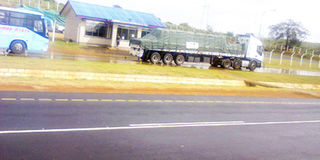Govt to introduce new weighbridges

What you need to know:
The ministry of Transport revealed this in Parliament over the weekend, noting that the first such modern weighbridge would be constructed at Vigwaza area.
Dodoma. Plans are underway to introduce modern weighbridges, known as ‘multi deck and weigh in motion,’ in a move to address the problem of delays by vehicles on major roads.
The ministry of Transport revealed this in Parliament over the weekend, noting that the first such modern weighbridge would be constructed at Vigwaza area.
Transport minister Gerson Lwenge said the decision was part of the government’s efforts to add efficiency in reducing traffic congestion on roads.
Eng Lwenge was responding to a question by Special Seats MP Mkiwa Kimwanga (CUF) who wanted to know what steps the government had taken to address the challenge of delays on roads due to the existence of many weighbridges.
She said for a long time stakeholders and businesspeople from neighbouring countries who use the Dar es Salaam port have complained of delays. However, Eng Lwenge responded that according to the Road Traffic Act of 1973 and the Road Traffic Maximum Weight of Vehicles Regulations of 2001, all vehicles carrying cargo of 3.5 tonnes and above should pass through weighbridges.
He said the major aim was to protect the country’s roads and bridges whose construction cost the country dearly.
Surveys have shown that 25 per cent of vehicles carry overweight cargo, thus contributing to the destruction of Tanzanian roads.
“No doubt that the situation would be worse if those cars would not be weighed,” he said.
He noted that the government would proceed with plans to educate transporters on their duty to observe the country’s laws, including carrying loads that are within the recommended weight. This would make them avoid inconveniences while on roads.




